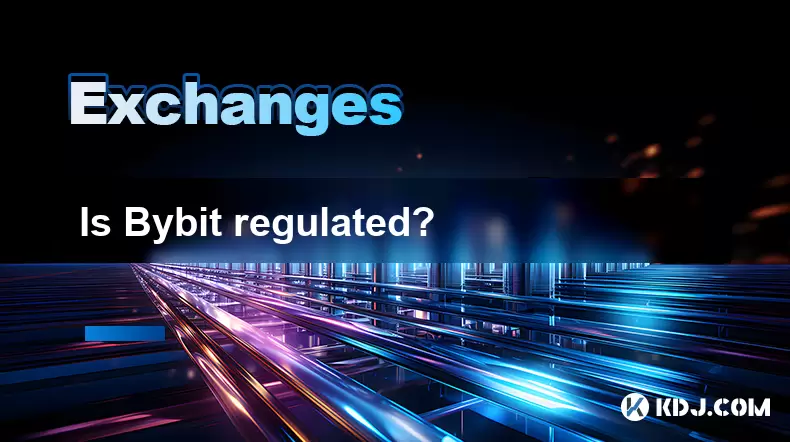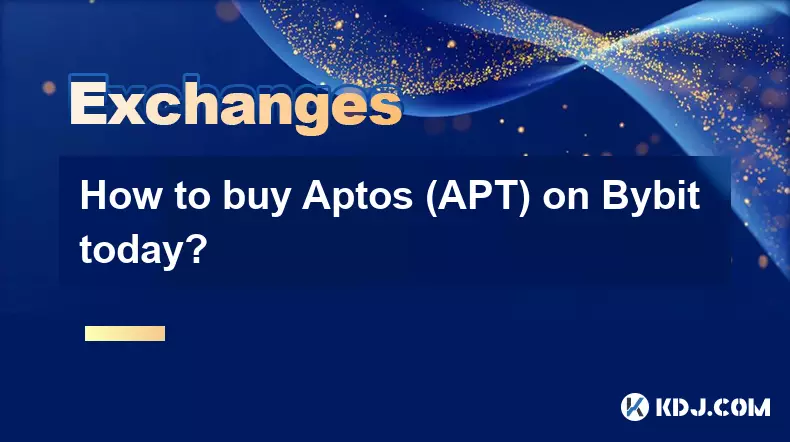-
 bitcoin
bitcoin $87959.907984 USD
1.34% -
 ethereum
ethereum $2920.497338 USD
3.04% -
 tether
tether $0.999775 USD
0.00% -
 xrp
xrp $2.237324 USD
8.12% -
 bnb
bnb $860.243768 USD
0.90% -
 solana
solana $138.089498 USD
5.43% -
 usd-coin
usd-coin $0.999807 USD
0.01% -
 tron
tron $0.272801 USD
-1.53% -
 dogecoin
dogecoin $0.150904 USD
2.96% -
 cardano
cardano $0.421635 USD
1.97% -
 hyperliquid
hyperliquid $32.152445 USD
2.23% -
 bitcoin-cash
bitcoin-cash $533.301069 USD
-1.94% -
 chainlink
chainlink $12.953417 USD
2.68% -
 unus-sed-leo
unus-sed-leo $9.535951 USD
0.73% -
 zcash
zcash $521.483386 USD
-2.87%
Is Bybit regulated?
Bybit operates under a multi-jurisdictional regulatory model, holding licenses in the BVI and Cyprus, while adhering to regional compliance and security standards.
Jul 18, 2025 at 03:57 pm

Understanding the Regulatory Landscape of Bybit
Bybit, as one of the leading cryptocurrency exchanges globally, operates in a complex and evolving regulatory environment. The exchange does not have a single overarching regulator but instead functions under a multi-jurisdictional model. This means that different parts of its operations are subject to varying degrees of oversight depending on the region. Bybit has made efforts to obtain licenses in certain jurisdictions, such as the British Virgin Islands (BVI) and the Republic of Cyprus, where it has registered legal entities.
It is important to note that regulation in the cryptocurrency industry varies widely by country. Some countries have embraced crypto assets and established clear regulatory frameworks, while others remain cautious or even hostile. Bybit does not actively market itself in certain highly regulated markets, such as the United States or Japan, where obtaining a license is particularly challenging and requires significant compliance infrastructure.
Bybit's Licensing and Compliance Measures
Bybit has taken steps to align with regulatory expectations in several jurisdictions. One of the key developments in this regard is the establishment of Bybit Technologies Ltd. in the British Virgin Islands, which holds a Digital Asset Business License under the BVI’s Financial Services Commission. This license allows Bybit to legally operate its crypto exchange services in that jurisdiction.
In addition, Bybit Europe Limited is registered with the Cyprus Securities and Exchange Commission (CySEC), which is part of the European Economic Area (EEA) regulatory framework. CySEC is a respected financial authority within the EU, and this registration allows Bybit to offer its services to customers in Europe under certain conditions. Users accessing Bybit from EU countries may notice differences in available features and leverage limits, as the platform complies with local laws.
Anti-Money Laundering (AML) and Know Your Customer (KYC) Policies
Bybit enforces KYC and AML procedures to comply with international financial regulations. These procedures are mandatory for users who wish to access higher trading limits or perform fiat conversions. During the KYC process, users are required to submit personal identification documents, such as a government-issued ID or passport, along with proof of address.
The exchange employs automated systems to monitor transactions for suspicious activity, and it has partnerships with third-party compliance platforms to enhance its verification capabilities. Bybit also reports to relevant authorities when necessary, especially in cases involving large transactions or potential fraud. These measures are designed to prevent the platform from being used for illicit financial activities, aligning with global regulatory expectations.
How Bybit Handles User Funds and Security
Bybit implements a multi-tiered security architecture to protect user assets, which is a key concern for regulators and users alike. The exchange uses cold storage for the majority of user funds, keeping them offline and away from potential cyberattacks. A portion of funds is kept in hot wallets for liquidity purposes, but these are protected by multi-signature technology and real-time monitoring.
Bybit also maintains a Secure Asset Fund for Users (SAFU), which acts as an emergency reserve to cover losses in case of unforeseen events such as security breaches. This fund is regularly replenished with a percentage of trading fees, ensuring that user deposits remain protected to the greatest extent possible. These security practices are often scrutinized by regulators, and Bybit's transparency in this area helps build trust.
Transparency and Communication with Regulators
Bybit has demonstrated a willingness to engage with regulators and adapt its operations accordingly. The company has issued public statements regarding its commitment to compliance and has hired legal experts to navigate global regulatory landscapes. Bybit also publishes regular reports on its reserves and system audits, which helps reassure users and authorities of its financial stability.
In some regions, Bybit has voluntarily restricted services to align with local laws. For example, the platform has limited or discontinued services in countries such as Singapore and Canada, where regulatory pressure has increased. These decisions reflect Bybit's strategic approach to compliance, balancing expansion with the need to avoid legal complications.
Frequently Asked Questions (FAQs)
1. Is Bybit legal in the United States?Bybit does not operate in the United States due to regulatory restrictions. U.S. residents are generally unable to access Bybit's services, and the platform blocks IP addresses associated with the country.
2. Does Bybit report to tax authorities?Bybit does not automatically report user activity to tax authorities, but users are responsible for reporting their crypto transactions in accordance with local tax laws. The platform provides transaction history and data exports that users can use for tax reporting purposes.
3. Can I trade fiat currencies on Bybit?Bybit offers fiat on-ramp services in certain regions, allowing users to deposit and withdraw fiat currencies such as USD, EUR, and GBP. These services are subject to KYC verification and may vary by jurisdiction.
4. How does Bybit handle regulatory changes?Bybit continuously monitors regulatory developments and adjusts its services accordingly. The platform has a dedicated compliance team that works to ensure adherence to evolving legal requirements across different jurisdictions.
Disclaimer:info@kdj.com
The information provided is not trading advice. kdj.com does not assume any responsibility for any investments made based on the information provided in this article. Cryptocurrencies are highly volatile and it is highly recommended that you invest with caution after thorough research!
If you believe that the content used on this website infringes your copyright, please contact us immediately (info@kdj.com) and we will delete it promptly.
- Rotorua's Parking Predicament: Will Coins Cash Out in the City of Sulphur?
- 2026-02-10 06:55:01
- The Shifting Stages of Honor, the Kennedy Center, and Modern Philanthropy
- 2026-02-10 07:20:02
- Wall Street's Wild Ride: Bitcoin, QQQ, and the New Era of Volatility
- 2026-02-10 07:20:02
- The Great SHIB Chill: OKX's Cold Storage Maneuver Sparks Recovery While Binance's Goes Unnoticed
- 2026-02-10 07:15:01
- Crypto's Crossover Moment: Airdrops, Tokens, and the Road to IPO
- 2026-02-10 04:25:01
- Axie Infinity Buyers Fuel Market Jump with New bAXS Token Airdrop and Technical Resurgence
- 2026-02-10 03:40:02
Related knowledge

How to buy JasmyCoin (JASMY) on Bybit?
Feb 09,2026 at 03:40am
Creating a Bybit Account1. Navigate to the official Bybit website and click the 'Sign Up' button located in the top-right corner. 2. Enter a valid ema...

How to contact Bybit customer support for urgent help?
Feb 05,2026 at 11:40pm
Accessing Bybit Support via Live Chat1. Log in to your Bybit account using the official website or mobile application. 2. Navigate to the Help Center ...

How to buy Injective (INJ) on Bybit in 2026?
Feb 09,2026 at 05:39pm
Account Registration and Verification Process1. Navigate to the official Bybit website and click the “Sign Up” button located in the top-right corner....

How to use Bybit Dual Asset investment for high yield?
Feb 06,2026 at 12:20am
Understanding Bybit Dual Asset Investment Mechanics1. Dual Asset Investment is a structured product offered by Bybit that combines a stablecoin deposi...

How to fix Bybit login issues quickly?
Feb 09,2026 at 06:00am
Troubleshooting Common Authentication Errors1. Incorrect credentials often trigger immediate rejection during Bybit login attempts. Users frequently o...

How to buy Aptos (APT) on Bybit today?
Feb 06,2026 at 07:40am
Creating a Bybit Account1. Navigate to the official Bybit website and click the “Sign Up” button located at the top right corner of the homepage. Ente...

How to buy JasmyCoin (JASMY) on Bybit?
Feb 09,2026 at 03:40am
Creating a Bybit Account1. Navigate to the official Bybit website and click the 'Sign Up' button located in the top-right corner. 2. Enter a valid ema...

How to contact Bybit customer support for urgent help?
Feb 05,2026 at 11:40pm
Accessing Bybit Support via Live Chat1. Log in to your Bybit account using the official website or mobile application. 2. Navigate to the Help Center ...

How to buy Injective (INJ) on Bybit in 2026?
Feb 09,2026 at 05:39pm
Account Registration and Verification Process1. Navigate to the official Bybit website and click the “Sign Up” button located in the top-right corner....

How to use Bybit Dual Asset investment for high yield?
Feb 06,2026 at 12:20am
Understanding Bybit Dual Asset Investment Mechanics1. Dual Asset Investment is a structured product offered by Bybit that combines a stablecoin deposi...

How to fix Bybit login issues quickly?
Feb 09,2026 at 06:00am
Troubleshooting Common Authentication Errors1. Incorrect credentials often trigger immediate rejection during Bybit login attempts. Users frequently o...

How to buy Aptos (APT) on Bybit today?
Feb 06,2026 at 07:40am
Creating a Bybit Account1. Navigate to the official Bybit website and click the “Sign Up” button located at the top right corner of the homepage. Ente...
See all articles










































































